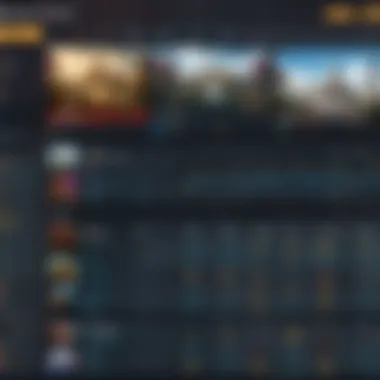Political Futures Betting: Trends and Implications


Intro
Political futures betting is a fascinating concept that blends the worlds of gambling and political forecasting. This growing trend has garnered attention from both casual bettors and serious political analysts. It involves placing wagers on the outcomes of political events, such as elections or legislative decisions. As the political landscape changes, so too do the dynamics of betting markets.
This article aims to analyze these trends comprehensively. It will explore how betting markets operate, the implications of this form of wagering on political discourse, and the ethical concerns that are often raised in this context. By examining case studies and relevant literature, the aim is to enrich understanding of political futures betting. It serves as a strategic tool, influencing individual decisions and broader societal dynamics. It is important to delve into potential future developments in this field, along with regulatory considerations that are increasingly relevant in this evolving domain.
Prelims to Political Futures Betting
Understanding political futures betting is essential as it unveils the interplay between wagering and political events. This practice allows individuals and organizations to speculate on the outcome of political scenarios, blending elements of finance, governance, and sociology. The insights gained from this analysis are crucial for grasping not just how bets are placed, but also the broader implications these bets may have on public perception and decision-making.
The significance of examining political futures betting lies in its ability to provide a unique perspective on the political landscape. It compels stakeholders to consider various factors that influence electoral outcomes and policy decisions. Furthermore, this examination opens pathways for strategic thinking about how information is disseminated and received in society.
By engaging with political futures betting, one also becomes familiar with the risks and rewards associated with predicting political events. This can enhance one's understanding of both market strategies and social dynamics. In this light, the importance of the topic is manifold, extending to political theorists, economists, and the general public interested in the mechanisms that shape governance.
Definition and Basics
Political futures betting, at its core, refers to the practice of making wagers on the outcome of elections or legislative decisions. Each bet reflects the individual’s assessment of an event's likelihood, essentially translating public sentiment into market terms. This form of betting operates similarly to traditional financial markets; it is influenced by current events, expert opinions, and emerging trends.
Market participants—be they casual bettors or institutional investors—often utilize futures contracts to align their positions with anticipated future events. These contracts may derive values from various factors, such as candidate popularity, policy proposals, and social dynamics. This predictive nature allows for a comprehensive approach to understanding political climates.
Historical Background
The roots of political futures betting can be traced back to the 1980s when it emerged as a novel method for predicting electoral winners and policy outcomes. Initially confined to informal channels, such as friendly wagers amongst peers, it began gaining traction in academic circles. During the 2004 U.S. presidential election, platforms like Intrade facilitated a more structured market for these bets, further legitimizing the concept.
Over time, broader acceptance of political futures markets has led to increased scrutiny. Scholars have sought to understand the correlation between betting markets and actual political results. They have identified substantial predictive power in these markets, often surpassing traditional polling methods. This revealed unexpected layers of sophistication in public opinion and the factors that drive it, leading to enhanced heuristics for futures betting.
Understanding Market Mechanics
Understanding market mechanics in political futures betting is essential for anyone interested in the convergence of politics and wagering. It highlights how predictions are formed, processed, and transformed into actionable outcomes within betting markets. This section aims to illuminate mechanisms that govern these markets, their operation, and their implications for bettors and political analysts alike.
How Political Futures Markets Function
Political futures markets operate similarly to traditional financial markets but focus exclusively on political events. These markets allow participants to bet on the outcomes of specific political events, such as elections or policy decisions. The underlying principle is that prices in these markets reflect the collective wisdom of participants, effectively serving as a forecasting tool.
In political futures markets, bettors can buy or sell contracts that pay out if a certain event occurs. For example, one might purchase a contract predicting a specific candidate will win an election. Prices fluctuate based on supply and demand, capturing shifting sentiment as new information becomes available. This fluidity is influenced by various factors including market news, major events, and expert opinions. Unlike conventional betting, these markets are dynamic, providing real-time insights into public sentiment as opinions evolve.
The establishment of such markets often hinges on regulatory environments. Depending on the jurisdiction, political futures can either be quite popular or heavily restricted. It's critical for participants to understand these regulations and their potential impact on market dynamics and liquidity.


Wagering Strategies
Navigating political futures markets requires thoughtful wagering strategies. Given the volatile nature of political events, strategic planning is essential for successful participation. Here are a few considerations for developing effective wagering strategies:
- Research: Thoroughly investigate candidates, policies, and trends. Understanding historical contexts and current events can provide valuable insights.
- Risk Management: Establish a budget for wagering and stick to it. Avoid placing excessively high bets on uncertain outcomes.
- Diversification: Do not place all bets on a single outcome. Instead, spread wagers across multiple outcomes to minimize risk.
- Timing: Enter markets at opportune moments. Prices fluctuate rapidly based on new information or shifts in public sentiment.
- Monitoring Trends: Keep a close eye on market reactions to political events. Trends can indicate public sentiment and predict market movements before they occur.
Political futures betting serves as a reflection of democratic processes, showcasing how public opinion may shift over time based on various influences.
The Role of Information in Political Betting
The landscape of political futures betting is significantly shaped by the flow of information. Understanding how information operates in this context is crucial to comprehend the efficacy of betting markets as predictive tools. In this section, we will explore two main components: the influence of news and events, and the dynamic interplay between expert predictions and public sentiment. Each element plays a vital role in shaping bettors’ decisions and, consequently, the betting dynamics.
Influence of News and Events
Current events and news reports can drastically sway betting markets. When political news breaks, it often leads to immediate shifts in public perception and, subsequently, betting odds.
- Media Coverage: The nature of coverage influences bettor bias. Events with extensive media coverage often lead to more active participation in betting. For instance, a scandal involving a politician can result in an increase in bets against that individual.
- Breaking News: Sudden changes, such as new policy announcements or unexpected political alliances, can abruptly alter the odds. Bettors who are quick to react to these changes may benefit significantly, while those who are slower may find themselves at a disadvantage.
- Analysis and Opinion Pieces: Beyond mere reporting, in-depth analyses also affect bettor confidence. When analysts provide insights that suggest a shift in political landscape, bettors often adjust their wagers accordingly.
“Information is power, especially in political futures betting where every detail can change the dynamics of the market.”
Expert Predictions vs. Public Sentiment
The competition between expert predictions and public sentiment reveals a complex relationship within the political betting realm. Both have unique influences, and bettors often weigh these factors differently.
- Expert Insights: Professional analysts who offer forecasts based on data analysis, historical patterns, and political trends provide bettors with a valuable resource. Those who trust expert opinions might base their bets on these forecasts, believing them to be more reliable than general public sentiment.
- Public Sentiment Trends: Despite expert analysis, the collective sentiment of the public can sometimes diverge significantly from expert predictions. This occurs especially in polarized environments, where emotions and biases may lead to overconfidence in certain outcomes.
- Market Behavior: The betting market often serves as a barometer for public sentiment. If there is widespread belief that a candidate will win, it will reflect drastically in the odds, regardless of expert opinion.
Impact on Political Discourse
The intersection of political futures betting and political discourse represents a significant area of exploration in understanding how market dynamics can impact public perception and decision-making. Within this framework, it is important to consider how these betting markets not only reflect but also shape opinions and influence behaviors at various societal levels. As political futures betting gains traction, its implications extend beyond mere wagering, entering into the realms of ethics, public sentiment, and democratic engagement.
Shaping Public Opinion
Political futures betting has the potential to mold public opinion significantly. As individuals engage in betting, they often pay close attention to the factors influencing odds and market fluctuations. This can lead to a more informed public, as participants delve into political dynamics, policy debates, and candidate viability. The act of betting itself can stimulate discussions, prompting individuals to articulate their views and analyze competing perspectives.
Moreover, the collective nature of betting markets aggregates individual opinions into a broader spectrum of sentiments. When large groups of people place bets, the resulting market odds can signal the prevailing public opinion on political events. For example, if a candidate's odds improve, it may suggest that more individuals believe in their potential to succeed. This creates a feedback loop, where the perception of candidates and policies becomes intertwined with active participation in futures betting.
Betting as a Polling Alternative
Betting markets can serve as an innovative alternative to traditional polling. While polls present a snapshot of voter sentiment, they can often be influenced by inherent biases, sample selection, or question phrasing. In contrast, political futures betting reflects real-time engagement and financial stakes in outcomes. Participants put their money where their mouth is, possibly leading to more honest reflections of sentiment.


Such markets can analyze probabilities more effectively and dynamically, responding to the latest news and developments in political arenas. For instance, major events such as debates, scandals, or policy announcements can alter betting odds quickly and reveal changing public sentiment faster than polls might. Furthermore, since betting outcomes are directly tied to actual events, this can enhance the reliability of the predictions made through these markets.
Ethical Considerations
The topic of ethical considerations in political futures betting is significant as it addresses the moral implications and regulatory demands that accompany this unique form of wagering. Understanding these considerations is essential, especially as political betting gains more traction in the public eye. The ethical discourse surrounding political futures betting often brings forth two critical elements: regulatory frameworks and potential manipulation within betting markets. These themes highlight the necessity of balancing innovation in betting practices with safeguarding democratic integrity.
Regulatory Frameworks
Regulatory frameworks play a crucial role in ensuring that political futures markets operate fairly. Such frameworks are designed to protect bettors and maintain the integrity of political processes. For instance, countries may have distinct laws governing gambling activities, which can include specific rules for political betting. In the United States, for example, the Commodity Futures Trading Commission oversees certain types of betting. Laws can vary state by state, leading to a patchwork of regulations that govern how and when bets can be placed on political outcomes.
"Regulatory oversight seeks to ensure a balance between the excitement of betting and the responsibilities that come with influencing public sentiment and opinion."
One benefit of having robust regulatory structures is that they provide a legal basis for operators, ensuring compliance and ultimately protecting consumers. Controlling factors such as age verification and identifying harmful addictive behaviors can also be part of the regulatory guidelines. However, the challenge lies in addressing the rapid evolution of technology and how it influences betting environments. If regulations cannot keep pace, there may be increased risks that undermine ethical standards in betting markets.
Concerns Over Manipulation
Concerns over manipulation within political futures betting are significant. They stem from the possibility of insiders or special interest groups attempting to sway outcomes for personal or financial gain. Such manipulation can undermine the confidence in political betting as a reliable indicator of public sentiment or election outcomes. When bettors suspect that information is being misused, it could result in a loss of trust in the market's validity.
Furthermore, the potential for misinformation can heavily influence bettors’ perceptions. For example, if false news is circulated about a candidate's likelihood of winning, the subsequent betting patterns may not accurately reflect genuine public sentiment. Efforts to educate bettors about how to critically assess the information that influences markets become paramount.
In summary, ethical considerations in political futures betting require a detailed examination of existing regulatory frameworks and the potential for manipulation. As the field expands, continued dialogue around these themes will be essential for maintaining the integrity of both political discourse and the betting industry.
Case Studies
Analyzing case studies in political futures betting is critical for understanding its practical applications and impacts. These examples illustrate how betting markets can influence political outcomes and decision-making processes. Through these case studies, the nuances of political wagering come to light, demonstrating not only the predictive potential of these markets but also the ethical implications that emerge from their use.
Notable Predictive Markets
Notable predictive markets offer valuable insights into the dynamics of political futures betting. One significant example is the Iowa Electronic Markets, which began in 1988. This platform allows users to buy shares in political candidates, effectively creating a market that reflects public sentiment towards elections. Results from this market have often outperformed traditional polling methods, highlighting its potential as a forecasting tool.
Another example is PredictIt, a platform that gained popularity during the 2016 U.S. presidential election. PredictIt allows anyone to wager on the likelihood of various political events, including election outcomes. Analysis from this market demonstrated how the fluctuations in betting odds matched up closely with real-world event developments. This correlation provides evidence of foreseeability within political events as predicted through market activity.
These predictive markets exemplify how political landscapes can be effectively analyzed through betting behavior, enabling better understanding of voter trends and candidate viability.
Analysis of Elections and Outcomes
The analysis of elections and their outcomes through political futures betting is crucial for gaining knowledge about electoral behavior. One approach to this analysis is utilizing betting odds as a forecasting tool. For instance, in the 2008 U.S. presidential election, betting markets consistently favored Barack Obama over John McCain long before the actual vote. This early indicator aligned with eventual outcomes, showcasing how political futures betting can effectively gauge public opinion.
Additionally, it reveals how markets react to key events. When a candidate participates in a significant debate or faces a scandal, these events will likely influence betting behavior. Observing these movements allows analysts to draw conclusions regarding voter sentiment and candidate strength.


"The ability to track how events alter market perception can be insightful, providing a lens into the electorate's priorities and concerns."
Future Trends in Political Futures Betting
Political futures betting is rapidly evolving. Understanding the emerging trends is essential for enthusiasts and stakeholders alike. As we look towards the future, several key factors are shaping the landscape of this betting market. These factors highlight the need for awareness of both technological developments and legislative changes that may affect how political betting operates.
Innovations in technology are propelling the market into new territories. With increasing access to data and analytical tools, bettors can now make more informed decisions. There is also a growing integration of social media platforms where discussions and predictions can take place in real-time. This aspect provides a new dimension to traditional betting practices. Furthermore, advancements in data analytics improve the accuracy of forecasts, thus enhancing the overall betting experience.
The evolution of legislation surrounding political betting merits close attention. As governments and regulatory bodies reassess their policies, new laws may emerge that redefine existing frameworks. With the expansion of legal political betting in various regions, there remains a significant opportunity for new markets to develop.
"Future developments in political futures betting will depend heavily on technological integration and supportive regulatory frameworks."
These changes could lead to innovations such as mobile betting apps tailored to political events, contributing to convenience and increased participation. A larger potential customer base can also affect the volatility and appeal of various betting markets.
In summary, the future of political futures betting is intertwined with technological advancements and changing legislation. Keeping a keen eye on these trends can lead bettors to capitalize on new opportunities and navigate the complexities of this dynamic environment effectively.
Technological Innovations
Technological innovations are reshaping every aspect of our lives, including how we engage with political futures betting. The impact of technology can be seen in various areas such as data analysis, artificial intelligence, and mobile applications. These innovations allow bettors to access real-time data, making informed decisions based on current events.
The rise of predictive analytics has been particularly notable. Bettors can analyze patterns from previous elections and political events. This access provides a deeper understanding of potential outcomes. Moreover, social media platforms, like Reddit and Facebook, are acting as forums for discussions, predictions, and sentiment analysis.
These advancements create an environment where bettors are more informed than ever; thus, improving the whole betting experience. Technology fosters transparency and accessibility, which are vital for attracting new participants.
Expanding Legislation
Legislation is another critical area that is set for change. Governments around the world are re-evaluating laws relating to political betting. This change comes in response to the increasing popularity of this market. As certain regions move towards legalization, the landscape becomes more complex. Different jurisdictions may have contradictory regulations, creating confusion for bettors navigating across borders.
Key aspects to monitor include potential regulation around advertising and the flow of information. Increased scrutiny may lead to stricter controls on how betting companies operate. This could mitigate concerns about manipulation and unethical practices, thus reinforcing consumer trust.
Additionally, as governments recognize the tax revenue potential from political betting, more regions are likely to consider its legalization. Expanding legislation offers opportunities for both bettors and bookmakers, enhancing market diversity and competition.
The End
The conclusion of this article encapsulates the intricate dynamics of political futures betting, emphasizing its importance in understanding contemporary political climates and decision-making processes. As this betting practice has gained traction, it has transformed from a niche arena into a noteworthy element influencing political discourse. The various aspects discussed throughout the article highlight how political futures betting serves as a tool for not only predictors but also political scholars and casual observers.
Summarizing Key Points
To consolidate the insights gained from the article:
- Definition and Mechanisms: Political futures betting allows individuals to place stakes on the outcomes of political events. Understanding the mechanics of these markets reveals their role in assessing probability and public sentiment.
- Information Dynamics: The relationship between news, event impacts, and betting odds is critical. It showcases how bettors utilize real-time information to influence their wagering decisions.
- Ethics and Regulation: Ethical considerations around manipulation and fairness in betting markets have emerged as key discussions. The regulatory frameworks existing in various jurisdictions aim to address concerns over market integrity.
- Case Studies and Predictions: Analysis of notable predictive markets, including elections and their outcomes, demonstrates the potential accuracy of betting as a forecast tool.
- Future Outlook: Technologies and legislative developments will shape the future of political futures betting. Monitoring these trends is essential for stakeholders in the betting community.
Final Thoughts on the Future of Political Futures Betting
As political futures betting continues to evolve, its influence on public discourse could deepen. The integration of technology enhances the accessibility of betting platforms to a broader audience, potentially amplifying participation. However, it will be crucial to maintain ethical standards and transparency in this marketplace. Observers should pay close attention to how legislation adapts to this changing landscape.















